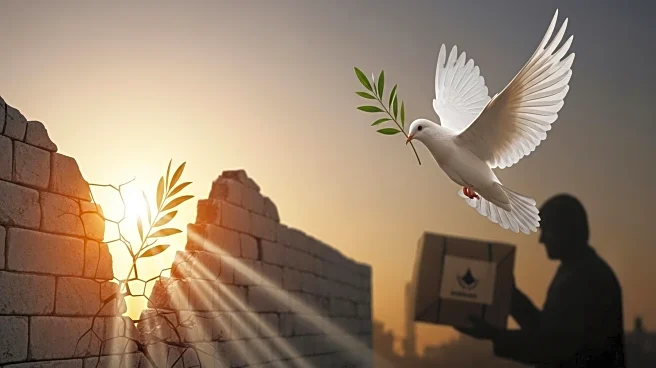What is the story about?
What's Happening?
The longest and deadliest war in the Israeli-Palestinian conflict may be nearing an end as Israel and Hamas have agreed to the first phase of President Trump's ceasefire plan. This agreement involves the exchange of all Israeli hostages for Palestinian prisoners, the withdrawal of Israeli troops, and the entry of humanitarian aid into Gaza. The announcement, made by President Trump on social media, comes two years after a Hamas attack on Israel that led to the assault on Gaza. The ceasefire has sparked emotional reactions from both Israelis and Palestinians, with families of hostages expressing relief and Gazans feeling a mix of joy and sorrow. The details of the deal are still emerging, but the exchange of hostages and prisoners is expected to occur over the weekend.
Why It's Important?
The ceasefire plan is significant as it marks a potential end to a prolonged and devastating conflict, offering a chance for peace and stability in the region. The exchange of hostages and prisoners could ease tensions and foster dialogue between the parties involved. Humanitarian aid entering Gaza is crucial for addressing the dire needs of the population affected by the war, providing essential supplies and support. This development could have broader implications for U.S. foreign policy and its role in Middle Eastern peace efforts, potentially influencing diplomatic relations and regional dynamics.
What's Next?
The next steps involve the actual implementation of the hostage and prisoner exchange, which is anticipated to take place over the weekend. Humanitarian aid is expected to flow into Gaza, providing relief to the affected population. Stakeholders, including political leaders and international organizations, will likely monitor the situation closely to ensure compliance with the ceasefire terms and address any emerging challenges. The success of this plan could pave the way for further negotiations and long-term peace initiatives in the region.
Beyond the Headlines
The ceasefire agreement may have deeper implications for the Israeli-Palestinian conflict, potentially altering the power dynamics and influencing future peace negotiations. Ethical considerations arise regarding the treatment of prisoners and hostages, as well as the humanitarian impact on civilians. The cultural and historical context of the conflict adds complexity to the situation, highlighting the need for sensitive and informed approaches to peacebuilding.















